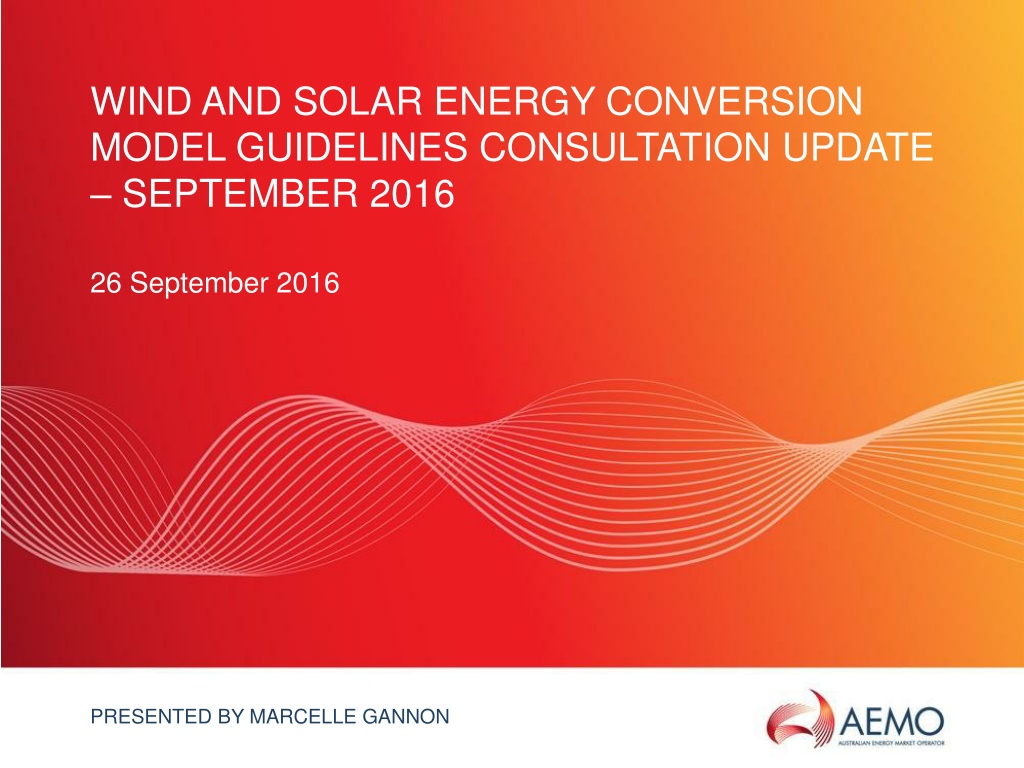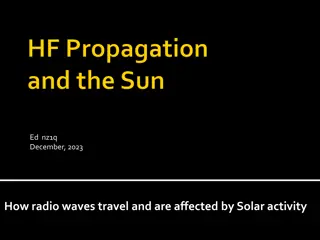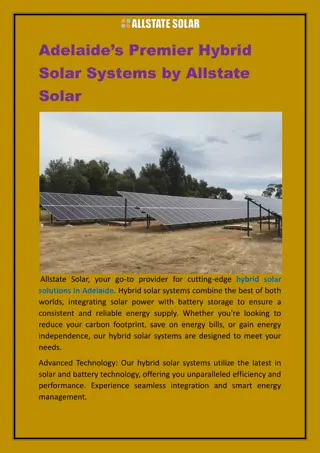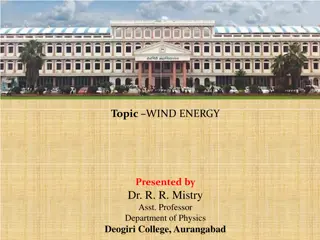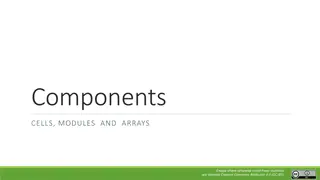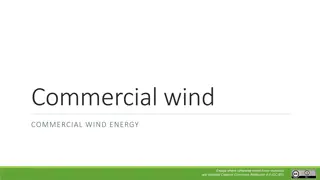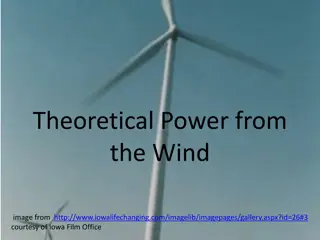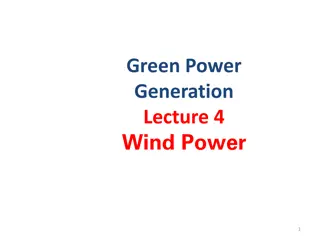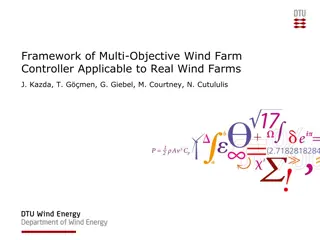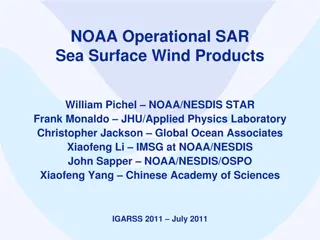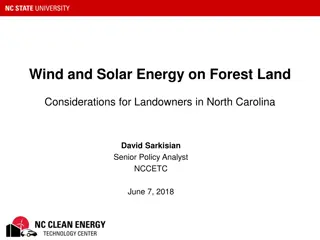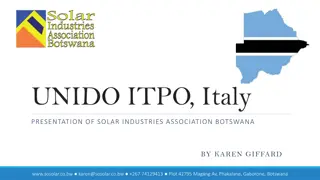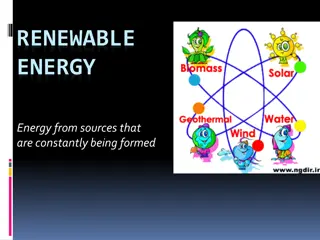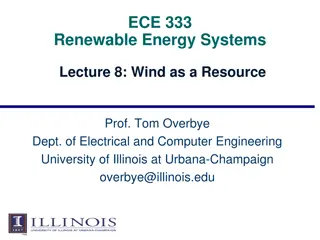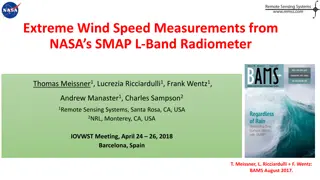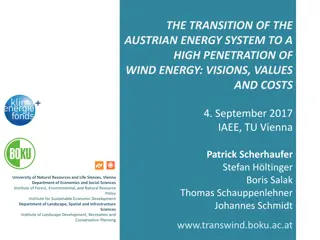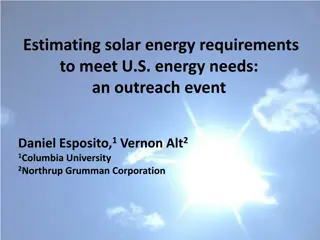Wind and Solar Energy Conversion Model Guidelines Consultation Update September 2016
Presented by Marcelle Gannon, this update covers the status of the consultation process, local limit and wind speed changes, extreme wind cut-out, possible power, estimated power proposal, and next steps. It provides insights into the current status of the consultation process, issues paper, draft report, and feedback received. The update also discusses local limit and wind speed adjustments, turbine cut-out concerns, and proposals for enhancing the estimated power modeling. Participants express the need for signals to accurately represent wind farm operations and considerations for various factors affecting energy conversion.
Download Presentation

Please find below an Image/Link to download the presentation.
The content on the website is provided AS IS for your information and personal use only. It may not be sold, licensed, or shared on other websites without obtaining consent from the author. Download presentation by click this link. If you encounter any issues during the download, it is possible that the publisher has removed the file from their server.
E N D
Presentation Transcript
WIND AND SOLAR ENERGY CONVERSION MODEL GUIDELINES CONSULTATION UPDATE SEPTEMBER 2016 26 September 2016 PRESENTED BY MARCELLE GANNON SLIDE 1
SESSION OVERVIEW Status of Consultation Process Local Limit and Wind Speed Changes Extreme Wind Cut-out / Other Cut-out Possible Power / Estimated Power Proposal Next Steps SLIDE 2
CURRENT STATUS OF CONSULTATION PROCESS Stage Issues Paper First stage submissions Draft Report Second stage submissions Final report due (currently) Date 18 March 2016 27 May 2016 2 August 2016 25 August 2016 7 October 2016 Draft Report stated Local Limit and Wind Speed minor amendments o Possible Power excluded o Extreme-wind cut-out SCADA proposed Strong participant feedback in second stage raised question whether AEMO should extend consultation to include new functionality discussed in following slides o SLIDE 3
LOCAL LIMIT AND WIND SPEED Local Limit SCADA signal resolved o Small amendments following second stage consultation o AEMO working on distribution network limit constraint equations Wind Speed SCADA signal definition resolved SLIDE 4
TURBINE CUT-OUT Draft report proposed new Extreme wind cut-out SCADA o To improve accuracy of AWEFS dispatch forecast when wind farm constrained during extreme wind events Feedback in submissions: o May be expensive or difficult for some farms o Many causes for cut-out or reduced production Ideas for a signal to allow AWEFS to model more of this behaviour more accurately in dispatch? o Turbines ready-to-run in next 5 minutes? o Share of capacity ready-to-run in next 5 minutes? AEMO needs some signal to represent what s happening in times of cut-out SLIDE 5
ESTIMATED POWER PROPOSAL Substantial participant feedback in second stage Estimated Power name to avoid confusion with existing Possible Power in control systems Participants keen to provide a signal to incorporate all factors affecting wind farm operation, including: o Wind speed / direction at each turbine o Effects of high wind speed, extreme wind direction change, site temperature, wind sector management o Dynamic effects of turbine pausing and feathering SLIDE 6
ESTIMATED POWER PROPOSAL AEMO would analyse the accuracy of trial data supplied by participants we need to work with you AEMO would concurrently consult with participants Regular reporting back with full transparency on outcomes o If it meets requirements for system security and market outcomes, should we then implement Estimated Power ? o If it doesn t meet requirements, should we then require the high- wind cut-out signal or an alternative cut-out signal? Post-implementation o AEMO would continue to measure performance and assess reliability SLIDE 7
PROPOSED ESTIMATED POWER DEFINITION Optional SCADA signal o The Generator s forecast of active power at the end of the next dispatch interval o Subject only to technical factors affecting operation of its generation and connection assets o Calculated assuming no distribution or transmission network constraints apply to the next dispatch interval SLIDE 8
ESTIMATED POWER PROPOSAL Q: How much detail to put in the definition? Q: Overlap with the Local Limit ? Q: Useful for your farm, or too complex? Q: Also for solar farms? SLIDE 9
NEXT STEPS FOR CURRENT CONSULTATION Next report published 14 Oct 2016 A week delayed to incorporate the complexity of the issues raised in the second stage submissions and discussions. Two Options: o 1 End consultation now, with Estimated Power not in ECM Guidelines o 2 Third round of consultation, to propose Estimated Power in ECM Guidelines SLIDE 10
NEXT STEPS FOR CURRENT CONSULTATION Estimated Power accuracy assessment o Accuracy assessment can start now using SCADA and historical data under Option 1 or 2 Local Limit o Option 1: Implementation work can commence from October o Option 2: Implementation delayed, though background work will minimise delay Estimated Power o Option 1: New full consultation would be required to put Estimated Power into ECM Guidelines minimum 4 months o Option 2: Could allow proposals with respect to Estimated Power to be implemented without new full consultation Question: Which option is preferred? SLIDE 11
NEXT STEPS FOR CURRENT CONSULTATION Timeline if a third stage of consultation was undertaken Stage AEMO second draft report published Third stage stakeholder submissions due AEMO final consultation report published Date 14 October 2016 4 November 2016 9 December 2016 SLIDE 12
ADDITIONAL CONSULTATION AND INVESTIGATION UNDERWAY/PROPOSED Power curve tuning o AEMO has been working with AWEFS vendor to improve the power curve tuning algorithm o Design improvements in final stage of negotiation Scoping of a full review of AWEFS o Continuing investigation into accuracy improvements to AWEFS other than Estimated Power Transparency and Bidding of Availability SLIDE 13
